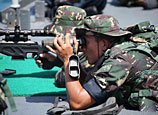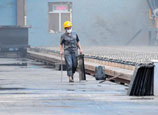
China again carried out a land-based mid-course missile interception test within its territory on Jan. 27. The test has achieved the expected objective, and shown the country's strategic deterrence system is shifting from relying merely on offensive weapons to integrating offensive and defensive weapons, Shao Yongling, a senior colonel from the People's Liberation Army (PLA) Second Artillery Command College, told People's Daily Online.
Shao said that China's strategic deterrent system used to mainly rely on nuclear weapons, and the country sticks to the policy of no-first-use of nuclear weapons. The development of mid-course missile interception technology will enhance its offensive and defensive capabilities.
Shao added that the United States is also developing such missile defense system. Most people may think that defense is passive, while attack is active. In fact, it depends on the type of weapons. The defensive capabilities of the United States are based on its strong offensive capabilities which enable it to deprive other countries of their second-strike capabilities.
He went to say that China can maintain a relatively small number of nuclear weapons given its increasing defensive capabilities. As long as enough nuclear weapons survive first-strike attacks, China can carry out nuclear retaliation against the attacker. Therefore, strong defensive capabilities are of great significance to the country's national security.
















 Quadruplet sisters and their family
Quadruplet sisters and their family


![]()
